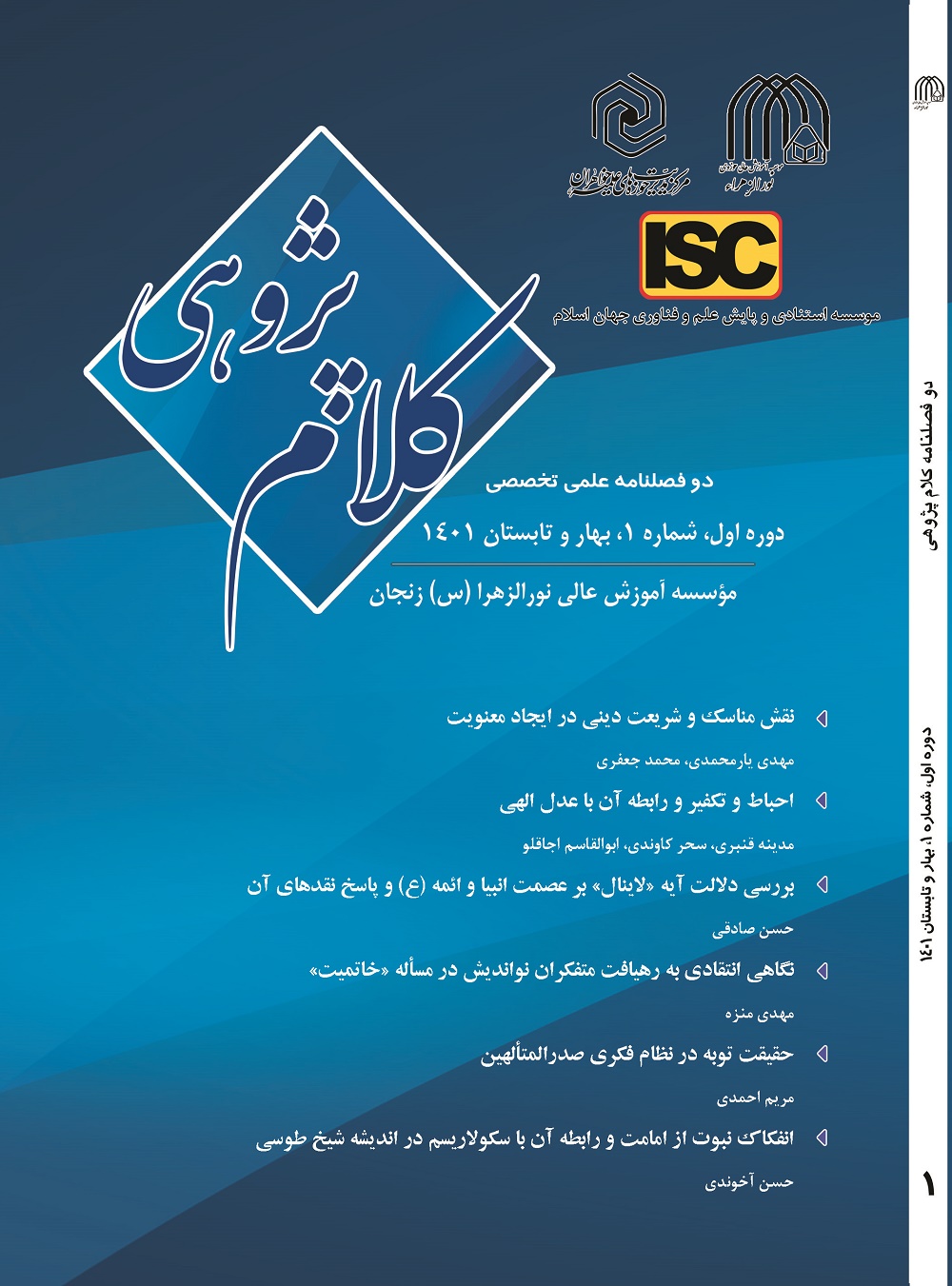نوع مقاله : مقاله پژوهشی
نویسنده
دکتری فلسفه و کلام اسلامی دانشگاه زنجان
چکیده
توبه را میتوان نوعی انقلاب درونی از ناحیه خودِ انسان علیه خویش تعریف کرد. بنابر تعبیرات دینی-کلامی، توبه همچون بیرون آوردن لباس چرکین از بدن و پوشیدن لباس مطهر است. توبه بدینسان، در مسیر استکمال نفسانی با نظر فلاسفۀ پیشاصدرایی، همچون شیخالرئیس بر اساس رابطۀ خلع و لبسِ نفس با ادراکات خویش مطابقت دارد. زیرا این فلاسفه، علم را از مقولۀ اضافه میدانند. حال آنکه در نظام فلسفی صدرالمتألهین، بر اساس مبانی نظری وی، ادراکات انسانی جزئی از وجود انسان بوده و عرَضی از عرضها نیست. بنابراین ملکات مکتسبۀ نفسانی (چه فضائل و چه رذائل) تنها صفات مستحکم موجود در نفس نیستند، بلکه خودِ نفس و خودِ وجودند. بدینسان حقیقت انسان در این سنت فکری، بر اساس عینیت صور مکتسبۀ نفس با خودِ نفس شکل گرفته و بنابر خلاقیت نفس انسانی و بر مبنای لبس بعد از لبس، توبه دیگر بیرون آوردن لباس چرکین از بدن و پوشیدن لباس مطهر نمیباشد، بلکه تحولی وجودی، انقلابی درونی در ذات، گذر از رذیلت به فضیلت و از شقاوت به سعادت است. بنابراین توبه امری بس دشوار خواهد بود، زیرا تطهیر از ملکات ناشی از رذائل که خودِ وجودند، نه در وجود، بس دشوار و تحول شخصیتی است.
کلیدواژهها
عنوان مقاله [English]
Truth of repentance in the thought system of Sadr al-Mutaalehin
نویسنده [English]
- maryam ahmadi
دکتری فلسفه و کلام اسلامی دانشگاه زنجان
چکیده [English]
Repentance is defined as a mental transformation on one’s own volition against oneself. According to the religious and verbal metaphors, repentance is like taking off dirty clothes and putting on clean clothes. In this sense, repentance matches the views of pre-Sadrian philosophers, such as Sheikh al-Ra'is, in terms of spiritual perfecting and in accordance with the soul’s disrobes and wear (khale w lubs) relation to its own perceptions. These philosophers place knowledge in the category of generic relation. However, in the philosophical views of Sadr al-Mutalahin and rooted in his theoretical grounds, the human perceptions are a part of the human existence and hence are not mere breadths. Consequently, the acquired properties (both virtues and vices) are not only the deep-seated qualities in soul, but are the very essence of being in itself. In this thinking tradition, the truth of human is formed based on the identity of soul’s acquired ideas with the soul itself. Based on the creativity of the human soul and in keeping with wear after wear (lubs baed lubs), repentance is no longer the taking off dirty clothes and putting on clean clothes but it is an existential transformation and inner revolution of the essence, a movement from vice to virtue and from misery to prosperity. Given that, repentance will be an extremely tough subject since purification from properties (stemming from vices) which are not a part of the existence but the existence itself, demands a personality overhaul and is a difficult journey.
کلیدواژهها [English]
- Sadr al-Mutaalehin
- Existential Transformation
- repentance
- Primacy of Existence
- Intensifying Motion
- ابن منظور، جمال الدین محمد بن مکرم. (1408ق). لســان العرب. بیروت.
- حیدری، کمال. (1392ش). کتاب المعاد: شرح الأسفار الأربعة لصدرالدین الشیرازی. بیروت: انتشارات مؤسسة الهدی للطباعة و النشر.
- خامنهای، سید محمد. (1383ش). حکمت متعالیه ملاصدرا،. تهران: انتشارات بنیاد حکمت اسلامی صدرا.
- دانشنامه جهان اسلام، منبع آنلاین rch.ac.ir
- راغب اصفهانى، حســین بن محمد. (1416ق). مفــردات الفاظ القرآن. تحقیق: صفوان عدنان داوودى. دمشق: دارالقلم.
- شیرازی، صدرالدین محمد. (2002م). الحکمه المتعالیه فی الاسفار العقلیه الاربعه. بیروت: دار احیاء التراث العربی.
- (1375ش). الشواهد الربوبیّة فی المناهج السلوکیة. تصحیح جلال الدین آشتیانی، حاشیه نویسی ملا هادی سبزواری. بیروت: انتشارات موسسۀ التاریخ العربی.
- (1360ش). اسرارالآیات. تهران: انتشارات انجمن حکمت و فلسفه.
- (1363ش). مفاتیح الغیب. ترجمه و تعلیق محمد خواجوی تهران: انتشارات مولی. چاپ دوم.
- ( 1376ش). رسالۀ سه اصل. تصحیح و مقدمۀ محمد خواجوی، تهران: انتشارات مولی، چاپ اول.
- عاطف الزین، ســمیح. (1422ق). معجم تفســیر مفــردات الفاظ القرآن الکریم. بیروت: دارالافریقیةالعربیة.
- عطار، محمد بن ابراهیم. (1360ش). تذکره الاولیاء. تهران: انتشارات محمد استعلامی.
- غزالی، محمد ابن محمد. (1423ق). إحیاء علوم الدین. بیروت: انتشارات دارالجیل.
- فیض کاشانی، ملامحسن، محمد بن رضی الدین شاه مرتضی. (1373ش). تفسیر الصافی. جلد پنجم. تهران: مکتبه الصدر. چاپ سوم.
- قاضی عبدالجبار بن احمد. (1998م). شرح الاصول الخمسه، قاهره: انتشارات چاپ عبدالکریم عثمان.
- قرشی، سید علی اکبر. ( 1412ق). قاموس قرآن. جلد هفتم. تهران: انتشارات دارالکتب اسلامیة. چاپ ششم.
- نجم الدین کبری، احمد بن عمر. (1362ش). اقرب الطرق الی الله. ترجمۀ علی همدانی، شرح کمال الدین حسین خوارزمی. تهران: انتشارات علیرضا شریفی محسنی.
- نظری، جواد، ملکزاده، هادی. (1397ش). تحلیل فلسفی توبه در پرتو حرکت جوهری از منظر انسان شناسی صدرایی. آیین حکمت: 38. صفحات 213- 238.
- نهج البلاغه.
- مطهری، مرتضی. ( 1366ش). حرکت و زمان در فلسفه اسلامی. تهران: انتشارات حکمت.
- . (1387ش). مجموعه آثار شهید مطهری. جلد بیست و سوم. تهران: انتشارات وزیری. چاپ چهارم.
- مفید، محمد بن محمد. (1371ش). اوائل المقالات فی المذاهب و المختارات. تبریز: انتشارات عباسقلی وجدی.

